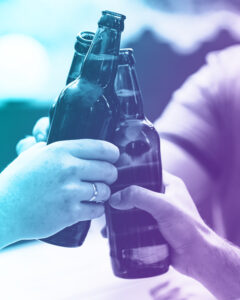Problem Drinking Vs Alcoholism
Alcohol consumption is a widely accepted social activity in many cultures. However, it’s important to recognize when alcohol consumption crosses the line from a casual indulgence to a more serious problem. Problem drinking and alcoholism are two terms often used interchangeably, but they represent distinct conditions with different implications. In this blog post, we will explore the difference between problem drinking and alcoholism, their respective signs and symptoms, and the significance of seeking treatment.

What Is Considered Problem Drinking?
Problem drinking refers to a pattern of alcohol consumption that has negative consequences on an individual’s physical health, mental well-being, or social relationships. It is crucial to understand that problem drinking does not necessarily indicate alcoholism. Instead, it signifies behaviors and habits that can lead to alcohol-related issues.
Problem drinking can manifest in various ways, including binge drinking, regular excessive drinking, or experiencing negative consequences from alcohol use. It is important to note that the line between social drinking and problem drinking can be subjective and may vary based on individual circumstances. Problem drinking is often characterized by the following:
- Increased tolerance: Needing to consume larger amounts of alcohol to achieve the desired effect.
- Failed attempts to cut down: Struggling to reduce or quit drinking despite repeated efforts.
- Neglected responsibilities: Alcohol use interferes with work, family, or social obligations.
- Continued drinking despite negative consequences: Persisting with alcohol use despite experiencing adverse effects on health, relationships, or other areas of life.
- These signs may indicate an unhealthy relationship with alcohol and the need to address the issue to prevent it from progressing into alcoholism.
What Is Alcoholism?
Alcoholism is a more severe condition than problem drinking. It is marked by a loss of control over alcohol consumption, withdrawal symptoms requiring alcohol detox when attempting to quit or reduce drinking, and a preoccupation with obtaining and consuming alcohol. It involves physical and psychological dependence on alcohol.
These signs indicate a severe alcohol use disorder that may require professional treatment and intervention:
- Loss of control: Inability to limit or stop drinking once started, often resulting in excessive or binge drinking.
- Craving and preoccupation: A strong desire or urge to consume alcohol, and spending significant time and effort obtaining or recovering from its effects.
- Physical and psychological dependence: Experiencing withdrawal symptoms such as tremors, anxiety, or irritability when alcohol is not consumed.
- Neglecting activities and relationships: Prioritizing drinking over responsibilities, hobbies, or social interactions.
- Continued use despite negative consequences: Persisting with alcohol use despite experiencing adverse effects on health, relationships, work, or legal issues.
Consequences of Alcoholism
Alcoholism can have severe consequences on an individual’s physical and mental health, relationships, and overall well-being. Some of these consequences include:
- Liver damage: Prolonged alcohol abuse can lead to liver diseases such as alcoholic hepatitis, cirrhosis, and liver failure.
- Increased risk of accidents and injuries: Impaired judgment and coordination due to alcohol consumption can result in accidents, falls, and other injuries.
- Relationship problems: Alcoholism often strains relationships with family, friends, and romantic partners due to behavioral changes, emotional instability, and neglect.
- Financial difficulties: Excessive spending on alcohol may jeopardize job security and financial stability.
- Mental health issues: Alcoholism is often associated with the worsening of mental health disorders such as depression, anxiety, and increased risk of suicide.
- Physical health problems: Alcoholism can contribute to a wide range of physical health issues, including cardiovascular disease, gastrointestinal problems, weakened immune system, and neurological damage.
- Legal issues: Alcohol-related behaviors such as driving under the influence (DUI) or public intoxication can lead to legal problems, including fines, license suspension, or even incarceration.
- Overdose: Excess consumption of alcohol can lead to alcohol poisoning, which causes serious health complications and sometimes even death.
These consequences highlight the urgency of addressing alcoholism and seeking professional help to mitigate further harm.
Is Problem Drinking a Sign of Alcoholism?
While problem drinking and alcoholism share similarities, problem drinking does not always progress to alcoholism. Problem drinking can serve as a warning sign and a potential precursor to alcoholism, but it can also be addressed and resolved without escalating to a severe alcohol use disorder.
Recognizing problem drinking and taking proactive measures to address it can prevent the progression to alcoholism. It is essential to seek help and support, even at the stage of problem drinking, to promote healthier habits and reduce the risk of developing a more severe alcohol use disorder.
Knowing the Warning Signs of Alcohol Use Disorder
Recognizing the warning signs of alcohol use disorder is crucial in addressing the issue before it worsens. Some common signs include increasing tolerance, failed attempts to quit, neglecting responsibilities, and continued drinking despite negative consequences. If you or someone you know is exhibiting these signs, it is important to seek professional help. Early intervention and treatment can make a significant difference in the recovery journey and prevent the progression of alcohol use disorder.
Getting Treatment for Alcoholism
 If you or a loved one is struggling with alcoholism, seeking professional treatment is essential. At Clean Recovery Centers, we provide comprehensive support throughout the recovery process. Our treatment programs are tailored to meet your unique needs and address the underlying factors contributing to alcoholism.
If you or a loved one is struggling with alcoholism, seeking professional treatment is essential. At Clean Recovery Centers, we provide comprehensive support throughout the recovery process. Our treatment programs are tailored to meet your unique needs and address the underlying factors contributing to alcoholism.
Our services include alcohol detox and recovery programs, which provide a safe and supportive environment for individuals to overcome physical dependence on alcohol. We also offer inpatient and outpatient treatment options, as well as specialized programs for co-occurring mental health disorders.
Our dedicated and compassionate staff are experienced in guiding individuals through the recovery journey, providing therapy, counseling, and support to address the physical, emotional, and psychological aspects of alcoholism.
By seeking treatment, you can regain control of your life, improve your overall well-being, and rebuild relationships damaged by alcoholism. Remember, recovery is possible, and you don’t have to face alcohol use disorder alone. Reaching out for help is a brave and important step towards a healthier and happier future.
If you or a loved one is facing the challenges of problem drinking or alcoholism, don’t wait to seek help. Contact Clean Recovery Centers today at (888) 330-2532 to learn more about our comprehensive alcohol use disorder treatment programs. Our experienced staff members are ready to provide guidance, support, and a personalized recovery plan to help you overcome alcohol addiction and regain control of your life.
FAQs
Can you drink alcohol and not have alcoholism?
Yes, many people enjoy alcohol socially, and even excessive drinking is not always considered alcoholism. Alcoholism, or alcohol use disorder (AUD) is when an individual has become physically or psychologically dependent on alcohol and needs it to function.
How many drinks a day is considered to have alcoholism?
There is no specific number of drinks per day that defines alcoholism. Alcoholism may look different from one person to the next. Generally, 1 drink per day for women and 2 drinks per day for men is considered safe. If someone is regularly consuming more than that and it has started to impact their health or quality of life, it might be time to look into treatment for alcoholism.
What are the signs of liver damage from alcohol use disorder?
Alcohol related liver damage (ARLD) is damage to the liver caused by excessive alcohol use. ARLD is a progressive disease and does not usually present physical symptoms until late-stage damage has occurred. Signs of ARLD include weight loss, yellow eyes, jaundice, swelling of extremities and the abdomen, and more.
Sources:
- Talbott Recovery. “Problem Drinking vs. Alcoholism: What’s the Difference?”
- Prosperity Haven. “Difference Between Alcoholism vs. Problem Drinking.”
- PAX Memphis. “The Difference Between Problem Drinking and Alcoholism.”
- Mayo Clinic. “Alcohol Use Disorder: When to Seek Help.”
- MedlinePlus. “Alcoholism and Alcohol Abuse.”


